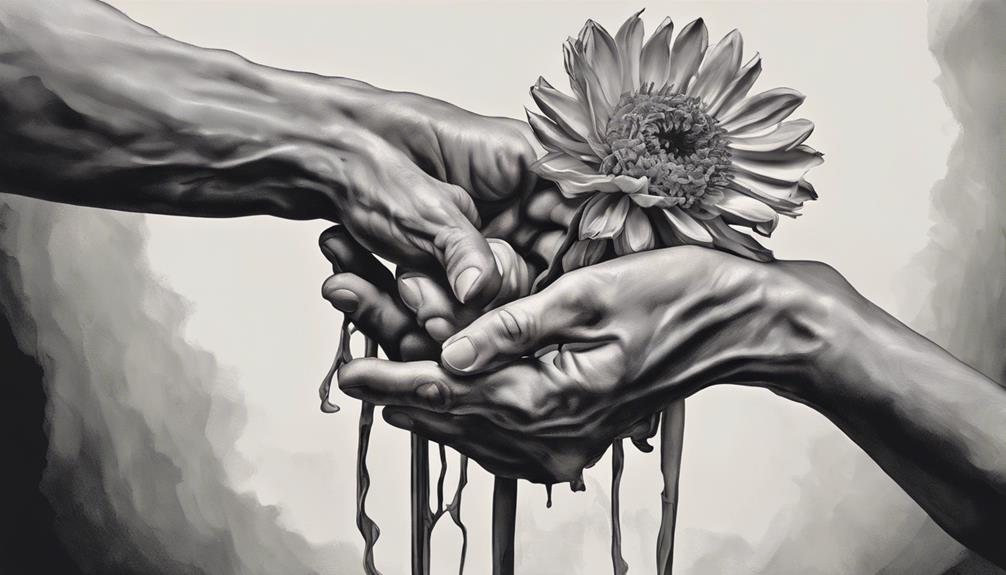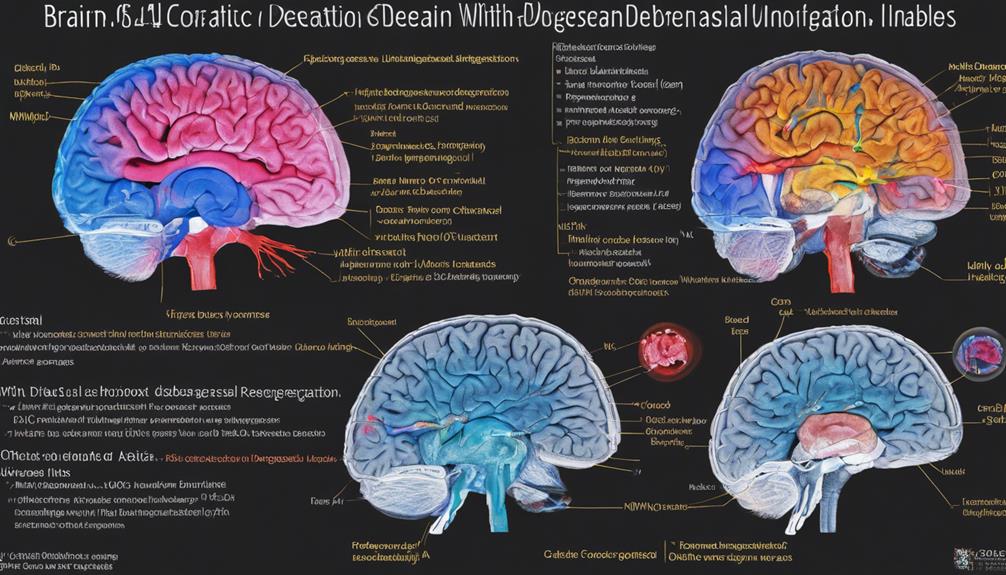When we learn about death and dying from Alycia Martel, we are exposed to a variety of cultural perspectives that influence our comprehension. Different customs and beliefs assist us in dealing with grief. Psychedelics have the potential to alter our perceptions of life, death, and the concept of existence. Engaging in spiritual practices enables us to better understand life’s impermanence and provide support to those encountering death. Personal contemplation and open dialogue are effective in managing loss and reaching a state of acceptance. By delving into consciousness beyond the self, we can gain profound insights into the nature of mortality. These themes shed light on the intricate nature of end-of-life experiences. Continue to delve deeper into the topic of death and dying to enhance your understanding.
Key Takeaways
- Alycia Martel shares insights on death and dying.
- Cultural perspectives on mortality are discussed.
- Spiritual practices related to death are explored.
- Personal reflections and experiences shape understanding.
- Importance of open conversations about death emphasized.
Cultural Perspectives on Death
Exploring the diverse cultural perspectives on death provides profound insights into human attitudes towards mortality. Different cultures have unique rituals, beliefs, and practices surrounding death that shape their attitudes towards dying and grieving. These cultural perspectives influence how individuals view death, cope with loss, and honor the deceased. Understanding these differences is essential for providing culturally sensitive care to individuals and families from diverse backgrounds during their end-of-life experiences.
In various cultures, death isn't viewed as the end but as a shift to another dimension or existence. This perspective impacts how individuals prepare for death, mourn the departed, and commemorate their lives. Some cultures have elaborate ceremonies and rituals to guide the deceased into the afterlife, while others focus on celebrating the life lived. These cultural practices offer profound insights into the human experience of death and provide guidance on how to support those grieving. Embracing and respecting these diverse cultural perspectives is vital for offering compassionate and culturally sensitive care to those facing end-of-life experiences.
Influence of Psychedelics on Perception

When exploring the influence of psychedelics on perception, it's important to understand that these substances can alter how we see ourselves and the world around us.
By expanding our minds through psychedelics, we open the door to new ways of thinking and experiencing reality.
The profound insights gained from these experiences can lead to shifts in beliefs about life, death, and existence.
Psychedelics and Altered Perception
Studying the effects of psychedelics on perception reveals a fascinating intersection of consciousness and cognition. Psychedelics like psilocybin and LSD can induce altered states of consciousness, impacting perception, emotions, and sense of self. Research suggests that these substances have the potential to enhance creativity, spirituality, and introspection through altered perception. Additionally, studies have shown that psychedelics possess therapeutic potential in treating various mental health conditions. The influence of psychedelics on perception has sparked interest in exploring consciousness and expanding understanding of altered states of mind. To better understand this, let's take a look at the table below showcasing the key aspects of psychedelics and their impact on perception:
| Key Aspects | Impact on Perception |
|---|---|
| Altered Consciousness | Profound Changes |
| Emotional Effects | Enhanced Emotions |
| Therapeutic Potential | Mental Health Benefits |
| Spiritual Growth | Increased Spirituality |
| Creativity Boost | Enhanced Creativity |
Mind Expansion Through Psychedelics
The profound impact of psychedelics on altering consciousness and perception opens doors to new territories of understanding and experience.
- Psychedelics can enhance spiritual awareness and provide insights into interconnectedness.
- Studies on psychedelic substances like psilocybin suggest therapeutic benefits for mental health treatment.
- Users often report experiences of ego dissolution and a sense of oneness with the universe.
- Controlled psychedelic experiences show promise in addressing existential distress.
Exploring the mind-expanding effects of psychedelics can offer new perspectives on life, death, and the nature of existence. By understanding how these substances influence perception, individuals can potentially find deeper meaning and insights into the mysteries of consciousness and the human experience.
Spiritual Practices Related to Death
Engaging in spiritual practices related to death offers individuals a profound opportunity to deepen their understanding of the impermanence of life. Many traditions emphasize observing decay and impermanence in places like cemeteries to cultivate this awareness.
Providing a sacred and loving presence for those facing death is a cornerstone of these practices, creating supportive environments for individuals during this transformation. Respecting individual karma and allowing each person to experience death uniquely is also significant in spiritual teachings.
Programs and practices that support a conscious dying process help individuals stay present and aware as they approach the end of life. For instance, Theravadan Buddhist monks often meditate in cemeteries to expand their awareness beyond the physical body, learning from death's teachings.
Personal Reflections and Experiences

When pondering death and dying, it's crucial to consider how we handle loss, welcome final moments, and find tranquility amidst sorrow. These experiences can mold our comprehension of mortality and help us recognize the significance of life.
Coping With Loss
Reflecting on our personal experiences of loss allows us to grow, find peace, and gain a deeper understanding of life. Here are four key points to ponder when coping with loss:
- Seek Support: Lean on friends, family, or support groups to navigate feelings of grief and loss together.
- Embrace Reflection: Take time to reflect on memories shared with the lost loved one to find comfort and healing.
- Practice Self-Care: Engage in activities that bring solace and peace, such as meditation, journaling, or spending time in nature.
- Honor Their Legacy: Keep the memory of the departed alive through rituals, storytelling, or creating a legacy project to find meaning in the loss.
Embracing Final Moments
Embracing the final moments with a loved one brings a mix of emotions and reflections that shape our understanding of life and mortality. Learning from these experiences can lead to profound growth and inner peace. As we confront the reality of loss, we often find ourselves embracing imminent death with a quiet resignation, yet also a deep sense of gratitude for the time shared. This acknowledgment allows us to focus on the precious present, fostering connections that transcend the physical realm. In this space of vulnerability, we might discover a deeper appreciation for life’s fleeting beauty and the strength that comes from holding on—and letting go.
Alycia Martel emphasizes that these moments of death and dying offer a unique opportunity for reflection and transformation. By fully embracing the reality of death, we can come to terms with our own mortality and find a deeper appreciation for the time we have.
These final moments provide a chance for us to learn about acceptance and the beauty of life's impermanence. Through this process, we can find peace and discover a new perspective on the cycle of life and the importance of cherishing each moment.
Finding Peace Amidst Grief
In the midst of grief, finding peace through personal reflections and experiences becomes a transformative journey towards acceptance and healing. Reflecting on our own experiences of loss can offer solace and understanding in times of sorrow.
Here are four ways to navigate grief and find comfort amidst the pain:
- Embrace the insights gained from encounters with death, allowing them to guide you towards healing.
- Confront the fear of death by reflecting on personal experiences and finding strength in those moments.
- Seek solace in near-death experiences, recognizing the profound lessons they can teach about life and mortality.
- Draw on the support and guidance of your community to cope with grief, knowing you aren't alone in your journey towards peace.
Importance of Open Conversations

Having open conversations about death and dying is essential for individuals to confront fears and gain insights into the end-of-life process. By openly discussing topics like death, dying, and the end-of-life process, people can better prepare themselves for what lies ahead. Planning for these eventualities and addressing emotional concerns surrounding passing becomes more manageable through these conversations. Understanding the complexities of passing and dying is vital for providing support to those facing such challenges. By fostering open dialogues, we promote a culture of acceptance and holistic care for individuals journeying through these difficult times.
| Open Conversations | Preparation | Understanding |
|---|---|---|
| Addressing fears | Planning ahead | Embracing complexities |
| Destigmatizing passing | Emotional support | Providing comfort |
| Promoting awareness | Facing challenges | Ensuring holistic care |
In these discussions, we encourage empathy, compassion, and a deeper understanding of the human experience surrounding passing and dying.
Exploring Consciousness Beyond Ego

Exploring into domains of awareness beyond personal identity involves investigating consciousness beyond ego. This journey delves into territories of consciousness where the ego, which often creates a limited sense of self, is transcended.
Here are four insights to aid in this exploration:
- Meditation Practices: Engaging in meditation helps in experiencing a state of awareness that surpasses egoic attachments, allowing individuals to tap into deeper truths.
- Spiritual Understanding: By letting go of egoic identifications, one can connect with a higher state of consciousness, fostering spiritual growth and understanding.
- Interconnectedness: Exploring consciousness beyond ego reveals the interconnected nature of all beings, highlighting our shared existence and unity.
- Profound Insights: This exploration can lead to profound insights into the nature of reality, providing a deeper understanding of universal consciousness and our place within it.
Thought-Provoking Themes Explored

Diving into enthralling themes allows for a deeper exploration of intricate ideas and perspectives. Alycia Martel's insights on death and dying shed light on the essential role of death doulas and Death Cafes in reshaping societal attitudes towards end-of-life experiences.
Death doulas play a vital role in providing holistic care, alleviating fears, and offering support during the dying process. Similarly, Death Cafes serve as safe spaces for open discussions, demystifying death, and fostering awareness about end-of-life realities. Martel emphasizes the significance of advanced planning, community support, and volunteer opportunities in enhancing end-of-life care.
Through education, support, and destigmatization efforts, death doulas and Death Cafes contribute to a more informed and compassionate approach to death and dying. By embracing these themes, individuals can engage in meaningful conversations, prepare for the inevitable, and ultimately promote a culture of acceptance and understanding surrounding end-of-life experiences.
Frequently Asked Questions
How Can Traditional Cultural Beliefs About Death and Dying Impact One's Grieving Process?
Traditional cultural beliefs about death and dying can profoundly influence our grieving process. They provide rituals, comfort, and guidance, shaping our understanding of loss and offering a framework for honoring and remembering our loved ones.
What Role Do Psychedelics Play in Expanding Perceptions of Death and the Afterlife?
Exploring psychedelics can open new dimensions of understanding death and the afterlife, enriching our perceptions. These substances may offer profound insights, guiding us to embrace different perspectives on existence beyond what we conventionally comprehend.
Are There Specific Spiritual Practices That Can Help Individuals Navigate the Fear of Death?
Facing the fear of death is a journey we all share. Engaging in spiritual practices such as mindfulness, meditation, and connecting with community can provide solace and guidance through this universal experience.
How Have Personal Experiences With Death Influenced Alycia Martel's Perspective on Life and Mortality?
Experiencing death has deeply shaped Alycia Martel's view on life and mortality. Through personal encounters, she has gained profound insights that guide her in understanding the preciousness of existence and the importance of living fully.
Can Open Conversations About Death Lead to a Greater Acceptance and Understanding of Our Own Mortality?
Open conversations about death allow us to face our mortality with clarity and compassion. By discussing this inevitable part of life, we can deepen our understanding, find peace, and live more fully in the present.
Conclusion
To sum up, understanding different cultural perspectives on death can help us better comprehend the inevitable process of dying.
Did you know that studies have shown that 88% of people believe it's important to have conversations about death and dying with loved ones?
By being open to discussing these topics, we can learn valuable lessons and gain a deeper appreciation for life.
Let's continue to explore and learn from the experiences of others to enrich our own understanding of death.









